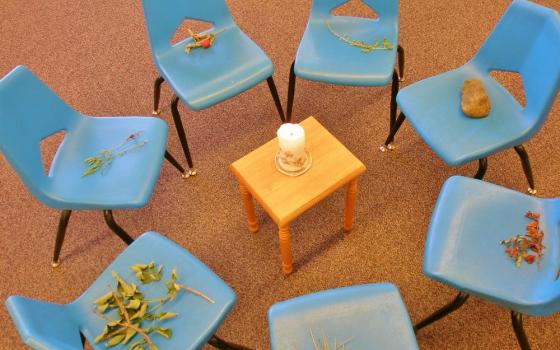This year the Loretto Community is celebrating the 25th anniversary of the Loretto Earth Network. I attended the celebration in Denver at the end of the summer and was glad I did.
The first speaker was Fletcher Harper, an Episcopal priest and executive director of GreenFaith, a national interfaith environmental coalition. What impressed me most about him was his political savvy. "We need to build community," he said. "Sometimes you do need to burn bridges," but "mostly we need to build bridges. . . . We need to make our arguments plausible to the moderates," he continued, "Not just speak to the choir."
Building bridges with those who are not on the same page is a value found in the Gospels. Even though Jesus castigated the double-standards and pretense of the Pharisees as a class, he welcomed individual Pharisees like Nicodemus. He built bridges with Samaritans, like the woman at the well. Although he preached nonviolence, Jesus chose an apostle, Simon the Zealot who, according to tradition, was part of a political movement that used violence in its quest to overthrow the Roman occupiers.
In my formation in religious life, we were taught to reach out with kindness to those who opposed us or with whom we disagreed. We were taught to build bridges as Jesus did. In my ministry on behalf of LGBT people and in my church reform work, I have interacted with traditionalists on a number of occasions. Each time I try to talk about what we have in common that unites us. That's how I feel we can begin to build bridges. Perhaps that's why I latched onto Harper's comment.
Harper's advice to build bridges with moderates makes good political sense. We who have passionately embraced the necessity of caring for the earth need to engage moderates so that our worldview becomes credible to them. We need to make arguments and explanations about climate change, advocating vegetarianism, and the dangers that fracking and fossil fuels pose to the environment plausible and persuasive to political moderates, particularly the business community. We can do this, Harper suggested, by speaking of "sustainable prosperity."
I was captivated by the concept of sustainable prosperity and think it can make sense to political moderates. Perhaps it is the lure of the word "prosperity" that becomes attractive.
What is sustainable prosperity? It means that the basic needs of all people will be met, their dignity will be recognized, and they will be able to be fulfilled and happy in the present and in the future, without denying others the same opportunities they enjoy.
Every human being should be able to have the basic needs of suitable housing, food, water, clothing, and other consumable goods satisfied and not have to live in abject poverty. But prosperity involves more than attaining only material needs. The human person has profound spiritual desires. Everyone needs sufficient time in one's life to reflect on the significance of events, to develop meaningful human relationships, and to share cherished values.
Groups advocating sustainable prosperity show the link or bridge between economics and the environment. These organizations, which have sprung up in the U.S., Canada, and Europe, advise governments, businesses and other groups to look at local needs and match them with available opportunities or assets. They design projects, such as "green jobs" in building, agriculture, transportation, telecommunications, food and other areas. These new "green jobs" will raise people from poverty by creating new employment opportunities.
In my neighborhood in Washington, D.C., a company is soliciting individual homeowners to install solar panels on their roofs at no cost to them. In exchange for this free service and lower monthly electricity bills, the homeowner allows the company to send the harnessed solar power to the electrical grid, which will deliver electricity to high demand places. This project decreases the world's dependence on fossil fuels, helps new businesses to develop, and provides jobs for people who can contribute their talents to the community. This is something that politically moderate business people can find attractive and beneficial to themselves and to the community.
The Loretto community and most other congregations of religious already participate in sustainable prosperity projects. We advocate, and hopefully practice, recycling, not purchasing Styrofoam products or bottled water when tap water is safe, converting buildings to "green spaces," and placing property into land trusts to protect it from excessive commercial development in the future.
So wasn't Fletcher Harper "just speaking to the choir," even though he urged us to engage the moderates? We religious are definitely the choir, but choirs need lots of rehearsals. We need to gather strength from each other, be inspired by those in the movement, and encouraged to forge ahead. We need the spiritual nourishment of hearing the song sung over and over again until it becomes a mantra.
The danger to the choir is to pat itself on the back. The challenge is to stretch itself. We in religious life can be tempted to feel complacent or unduly proud because we are working toward a future of sustainable prosperity. The challenge may be to ask ourselves if we are too prosperous.
I have met many people not in religious life who tell me that they would like to have a vow of poverty as I do — no worries about their next meal, having a roof over their heads, or someone to take care of them in their old age. I am definitely not poor. I live a middle-class U.S. lifestyle or even a rich lifestyle, by world standards. Of course, "sustainable prosperity" means that all people should be as secure as I am. But until we reach that point, I would prefer to take a vow of sharing instead of a vow of poverty. I would like some community discussions on "What can we do without so that others may have what they need?" Something for us all to think about.
[Jeannine Gramick is a Sister of Loretto who has been involved in a pastoral ministry for lesbian and gay Catholics since 1971. She co-founded New Ways Ministry and has been an executive coordinator of the National Coalition of American Nuns since 2003.]

